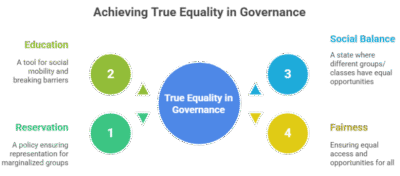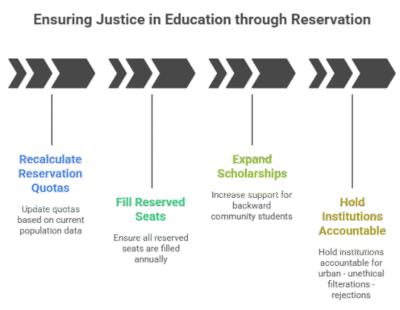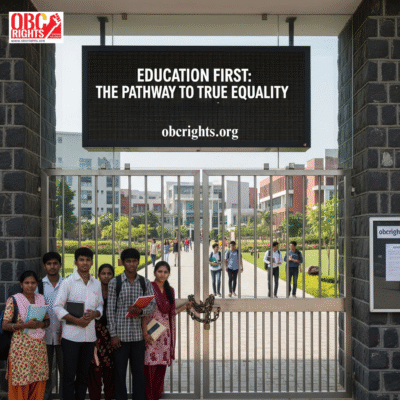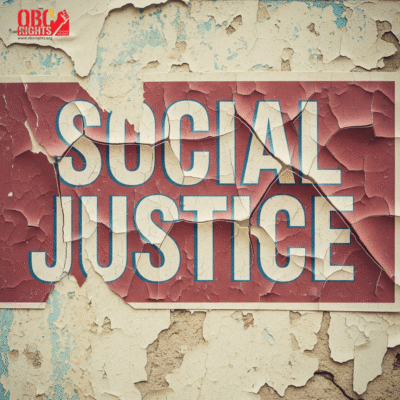Democracy in India promises justice, liberty, and equality to all citizens. Yet, when we look at access to higher education, the picture tells a different story. Backward and marginalized communities remain underrepresented in universities, elite institutions, and decision-making spaces. To achieve true equality, education must come first. More importantly, the percentage of reservations in higher education must reflect the real social and population realities, not outdated figures. Without expanding access, governance will remain unequal, dominated by the privileged few. The fact is that either the reservation is not given or, even if given silently, OBCs are filtered by invoking tools like “NFS” (Not Found Suitable).
Why Reservation in Education Matters
Reservation is not an act of generosity; it is a rightful correction for generations of denial and exclusion. Education is the strongest weapon to dismantle caste barriers and unlock opportunities for all. When backward communities gain entry into higher education, they not only improve their own lives but also change the social balance. It reduces the gap between advanced and backward stages/states.
If only a small percentage of seats are reserved, while the majority remain inaccessible, can we claim fairness? Expanding the reservation is not about reducing opportunities for others—it is about ensuring a level playing field. Only then can we move closer to true equality in governance and representation.

Reservation Percentages: Outdated and Insufficient
The current reservation structure for OBCs in central educational institutions is capped at 27%. This figure was based on old data from the Mandal Commission, conducted more than four decades ago. Since then, population figures, socio-economic realities, and the scale of educational backwardness have drastically changed. More than all most of the Central Institutions adopt various filter tools like NFS, to prevent the access of OBC students to higher education.
Yet, policy has failed to keep pace. While OBCs make up more than half of India’s population, they continue to be underrepresented in IITs, IIMs, and universities. Many seats meant for OBCs remain vacant due to poor awareness, lack of preparatory support, or bureaucratic hurdles. If reservations do not reflect real demographics, they cannot deliver justice.
Higher Education and Representation in Governance
Education is the entry point into leadership and governance. Most IAS officers, judges, professors, and policy-makers are products of higher education. If backward classes are left out of these institutions, their voices remain unheard in governance.
True inclusivity requires not just symbolic representation but proportional presence. Reservation is the mechanism to achieve this. Increasing the percentage of reserved seats in higher education is, therefore, not just an academic issue—it is a governance issue. Without wider access, backward communities remain spectators instead of participants in India’s democracy.
Addressing the Usual Criticisms
Some people claim that raising reservation levels reduces the value of merit. But merit cannot be separated from privilege. Access to coaching, elite schools, and resources gives certain communities an enormous head start. Reservation does not take away merit; it redefines competition by making it fairer.
Another criticism is that existing quotas are enough. The truth is, they are not. Data shows OBCs remain underrepresented in most central institutions. Expanding quotas simply acknowledges demographic reality. Without this correction, true equality will remain a distant dream.

The Way Forward
To ensure justice, India must:
- Recalculate reservation quotas based on up-to-date population data.
- Fill all reserved seats instead of letting them lapse year after year.
- Expand scholarships and support programs so students from backward communities can thrive in higher education.
- Hold institutions accountable for discriminatory practices that block OBC access.
By implementing these measures, reservations can become an effective instrument for inclusion, not just a symbolic promise.
Education Is Justice
A democracy cannot be inclusive if education remains exclusive. Increasing quotas in higher education marks the beginning of building fair governance. It ensures backward communities are not silenced but empowered to lead, decide, and contribute. The principle/logic behind the reservation must be understood by all.
Education must come first because it is the foundation of justice. And justice means giving every community—not just the privileged few—a fair chance. Only then can India claim to have built a pathway toward true equality in governance and society. If every citizen or all deserving citizens become knowledgeable, it will definitely pave the way for holistic development.



